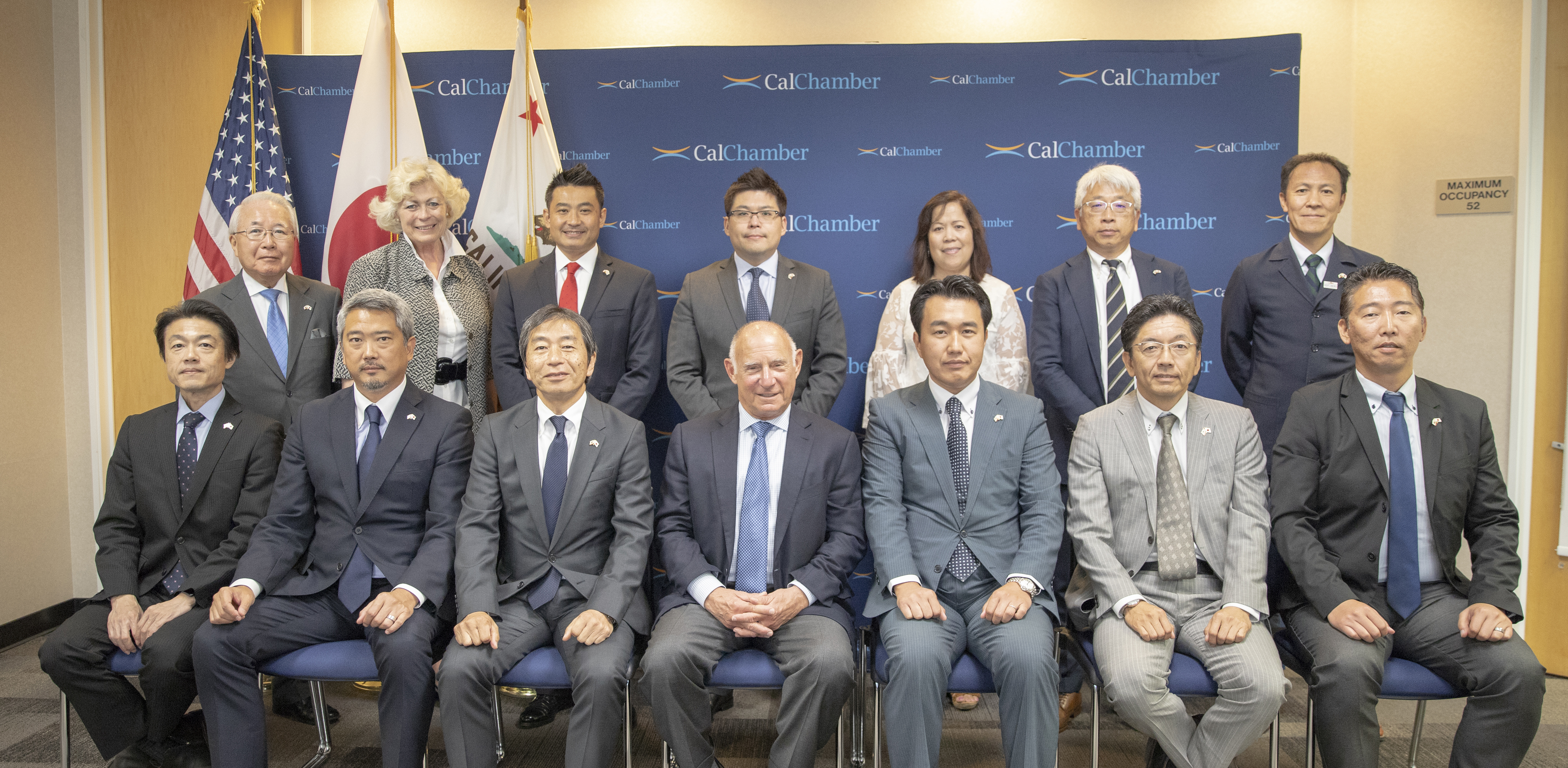
An annual meeting between the California Chamber of Commerce and Japan business leaders highlighted California’s continuing interdependence with one of its largest trade and investment partners.
Leading the Japanese business delegation were Kiichi Nakajima, president of the Japan Business Association of Southern California (JBA) and vice president of the Southwest Region with Japan Airlines Co., Ltd., as well as Masayuki Matsumura, vice president of the Japanese Chamber of Commerce of Northern California (JCCNC) and director of Mizuho Bank.
Representing the CalChamber at the Thursday, June 20, luncheon were Allan Zaremberg, president and CEO, and Susanne T. Stirling, vice president, international affairs.
The JCCNC was established as a nonprofit corporation in 1951 to promote business, mutual understanding and good will between Japan and the United States.
JBA, founded in 1961, is a nonprofit organization consisting of nearly 500 Japanese corporations doing business across Southern California.
Discussion Themes
The JBA and JCCNC meeting covered a variety of themes, including California’s current tight labor market and ways Japanese companies could overcome this challenge. State and federal environmental and trade policies also were on the agenda.
The Japanese business delegation also discussed any incentives that may exist for companies that are considering moving their operations out of California.
The group also spoke about the many important Japanese contributions to the California economy, as Japan is one of the top foreign direct investors in California. Lastly, the group asked the CalChamber to share its top priorities.
Statistics
Japan a Top Investor in U.S.
The United States is a large supplier of chemicals, transportation equipment, and computer and electronic products to Japan. Japan is also one of the largest U.S. foreign markets for agricultural products.
U.S. exports to Japan were $74.96 billion in 2018, making it the fourth largest export destination for the United States. Imports from Japan to the United States were $142.59 billion, with transportation equipment accounting for 42.7%.
According to the most recent figures, U.S. direct investment to Japan totaled $129 billion in 2017, largely in financial, software and internet services. Foreign direct investment (FDI) from Japan into the United States was $469 billion in 2017, making it the third largest source of FDI in the United States.
In 2014, Japanese FDI in the United States supported 860,600 jobs and contributed $8 billion to research and development, as well as another $86.6 billion to expanding U.S. exports.
The top industry sectors for Japanese FDI are: auto components, industrial equipment, automotive OEM, plastics, metals and software and IT services (Select USA).
In 2017, by country of ultimate beneficial owner, the third largest investing country into the U.S. was Japan, investing more than $34 billion (Bureau of Economic Analysis).
Strong California-Japan Ties
California continues to be the top exporting state to Japan, accounting for more than 17% of total U.S. exports. Japan has remained California’s fourth largest export market since 2010, after Mexico, Canada and China.
California exports to Japan, the world’s third largest economy, totaled $13 billion in 2018. Computers and electronic products accounted for 17.7% of total exports.
Imports into California from Japan were $33.6 billion, with transportation equipment accounting for almost half of total imports.
California is currently the top importing state in the United States for products from Japan. In addition, California buys more products from Japan than any other country besides China and Mexico.
Japan is consistently one of the top three sources of FDI into California. Japanese-owned firms account for more than 120,000 jobs in California and for 18.1% of California’s total foreign-owned employment in 2014 (Pacific Partners 2017).
The Los Angeles Business Journal reports that in Southern California, the No. 1 country for FDI through foreign-owned enterprises (FOEs) is Japan. Japanese FOEs in Southern California provide more than 85,000 jobs through over 2,500 firms. This amounts to $5.35 billion in wages (Los Angeles Business Journal, May 21, 2018). The top sectors of Japanese FOEs are information, financial activities, retail trade, wholesale trade, and manufacturing.
Other Notes
The annual report prepared by JCCNC and JBA includes the following: It is said that the first arrival of a Japanese person to California was in 1850. Following this, the first official Japanese delegation to the United States arrived in San Francisco on March 17, 1860.
Since then, California and Japan have built a strong relationship through various historical, cultural, and economic events. California and Japan have established 98 sister cities—25% of all sister cities in the United States.

